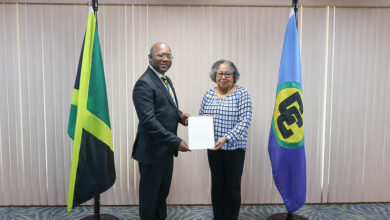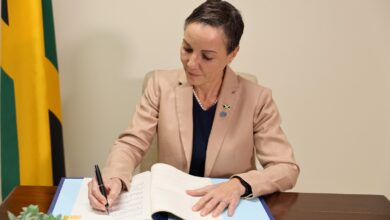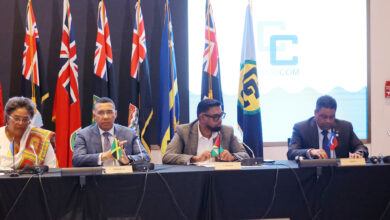Informed minds; proud faces and without doubt hearts too; all 104 of them between the ages of 5 to 18 years with their thirty-four parents of mostly mothers, indeed no less proud, no less informed. It was the occasion of the graduation ceremony of the Law Enforcement Assistive Programme for Schools (LEAPS), a project of the Cunupia Community Champions for Change (4Cs).
But this occasion on Saturday, 1 August 2015, at the Enterprise Government Primary School, Trinidad and Tobago, was not just your mere graduation ceremony. It was one which boldly showed the benefits of partnership, the accomplishments of team and highlighted the role of the Caribbean Community’s (CARICOM’s) work on the ground, as it sought to be an effective partner in its quest to build the social resilience of this dedicated space called Community.
Background
In a way, the occasion and its process could be described as the first fruits of the community component of the CARICOM/Spain pilot project, “Support for Reducing Youth on Youth Violence in Schools and Communities”. Currently being piloted in five CARICOM Member States; its objective is to contribute to a reduction in the incidence of `youth on youth’ violence in selected schools and communities. Project outputs include capacity building initiatives which target young people 10-35 years old, teachers, parents, community members and bodies. One of its unique features is the establishment of Champions for Change Clubs (CCCs) in schools and the community.

To date, this CARICOM Secretariat implemented, Spain funded Project, has established five CCCs (four school-based and one community-based) with approximately 450 members; conducted Crime Prevention through Environmental Design training workshops (CPTED) in three schools, benefitting approximately 150 persons; trained more than 100 parents; created awareness through the sharing of multi-media information to ministries of youth, CYAs, youth networks and CCCs, among other accomplishments.
The timeliness of this project cannot be overemphasized. A glimpse of youth violence in the Caribbean, according to a 2010 regional survey in seven CARICOM Member States, indicates several trends. These include a gender dimension to violence, an increase in violence among pre-adolescents; an increase in school violence; close association of youth violence with violence in the Community; and violence being perpetrated out of fear, or in response to a perceived threat.
Similar to some countries in Latin America, violence is the lead cause of death among males aged 15-24 in the Caribbean. WHO Studies also show the steady increase in alcohol and other drug use, sexual behaviour and violence in our schools. This is of even greater significance when it is taken into consideration that, for the Caribbean, school remains one of the key socialising environments for the Region’s youth. According to an IADB 2012 report, “class attendance of the Region’s share of elementary and secondary school-age children stands at 95.0 per cent and 73.0 per cent, respectively”.
Partnering with the Cunupia District: Sensitisation through education
Like other communities in Trinidad and Tobago, the Caribbean and the wider world, the Cunupia District is negatively impacted by alcohol and other drug use, teenage pregnancy, sexual crimes, gang activities, fighting, among other behaviours.[1] The 4Cs, in partnership with the Cunupia Community Police, therefore provided an ample opportunity through LEAPS to respond to, in the words of one of the speakers, Inspector Michael Jackman, “the urgent need to repair our community”.
Sensitisation through education is one of the many ways in which to facilitate change in individuals. LEAPS, the brainchild of Woman Police Constable (WPC) Betty James, was implemented by the 4Cs under the theme “Reaching Out” and “Making a Difference”, with the overarching purpose of stimulating positive change in children and families.
Preparation for “Reaching Out”, the first phase of LEAPS began in November 2015 and included an assessment of the risk, needs and challenges being faced by community members. Interventions were developed into sessions for children and parents. For five Saturdays, through June 2015, approximately 138 precious minds of our Caribbean Community were exposed to the basic information on domestic violence, substance abuse, sexual crimes and anger. They were shown how to identify the causes, effects, consequences, risk factors of these societal maladies and the impact of the law in this regard. More importantly, they were taught the rudimentaries of respect for self, others and country and the importance of self esteem.
Their parents, on the other hand, were exposed to training on parenting skills; how to identify social welfare programmes suitable to need, as well as initiatives for sustainable economic development. They were sensitized on the impact of the law on domestic violence, substance abuse and sexual crimes. The opportunity was also used to refer parents to suitable government programmes where necessary, including counselling and health Institutions.
The graduation, for participants and stakeholders alike, was indeed a momentous one, in that it represented a celebration of accomplishments and determination and resilience. What resonated with Ray Gittens, School Safety Officer and Guest speaker, were the fathers who completed the course signaling the importance of their engagement in the lives of their children, and the difference this made especially for the sons.
For 4Cs President, Annasia King, “taking the fresh minds of our youths and exposing them to the skills needed to be successful can be seen as quite a task”. For her, LEAPS ably demonstrated the fact “when individuals work together, whole groups are raised up and the impossible becomes possible and achievements become our destiny”.
For WPC James, “it was good to see the change of behavior in some of the children, who were normally deemed as bad behaved”. She added that the second phase of LEAPS will give them more training in social life including mediation training to deal with conflict situations at home and elsewhere”.
In invited comments, Spain’s Deputy Head of the Mission in Trinidad and Tobago, Belén Yuste, noted that “Spain’s cooperation policy is specifically active in the domain of security… and in enhancing and supporting citizen security policies in third countries.
“Crime and violence negatively affect young people in their current development and later in adulthood”, she said, adding “the pertinence of programmes and projects like this one is incontestable”.
Youth on Youth Violence Project Team leader, CARICOM Secretariat staff, Beverly Reynolds acknowledged CARICOM’s concerted efforts to respond to crime and insecurity, and expressed deep appreciation to the Kingdom of Spain for their support of this initiative.
Crime and insecurity remains one of the principal obstacles to social and economic development in the Caribbean. Conservative estimates place annual direct expenditure on youth related crime and violence in five CARICOM States between 2.8 per cent and 4 per cent of GDP. (Chaaban, 2009).
In July 2014, CARICOM Heads of Government approved its Community Strategic Plan for 2015-2019); identifying six strategic priorities of which Deepening Crime Prevention Initiatives and Programmes is an area of focus in the strategic priority of Building the Social Resilience of the Community.
[1] Data from community consultation and assessment conducted by Cunupia Community Police






